Biological students’ perception of the advantages and disadvantages of learning English with native and non-native English-speaking teachers
A research on 126 students from Department of Biology, Ho Chi Minh City University of
Education on the advantages and disadvantages of learning English with native and non-native
English-speaking teachers was carried out in January, 2018. Data on their perceptions towards the
reasons why they liked studying with teachers were gained from questionnaires. Thirty students in
this research were also randomly selected for interview to get their suggestions for the better ways
of teaching English. The result showed that biological students preferred learning pronunciation
(88.1%), listening (64.2%), speaking (59.5%) and reading (57.9%) with native English-speaking
teachers. However, most of them indicated preference to study grammar (63.5%) and writing
(43.7%) with non-native English-speaking teachers. Students also suggested some effective ways of
teaching English including choosing practical and interesting topics, applying good method of
teaching, increasing time of teaching, transferring lesson by using games, stories, picnics, and so
on. The findings will help Deans take into consideration the importance of teachers in teaching
English
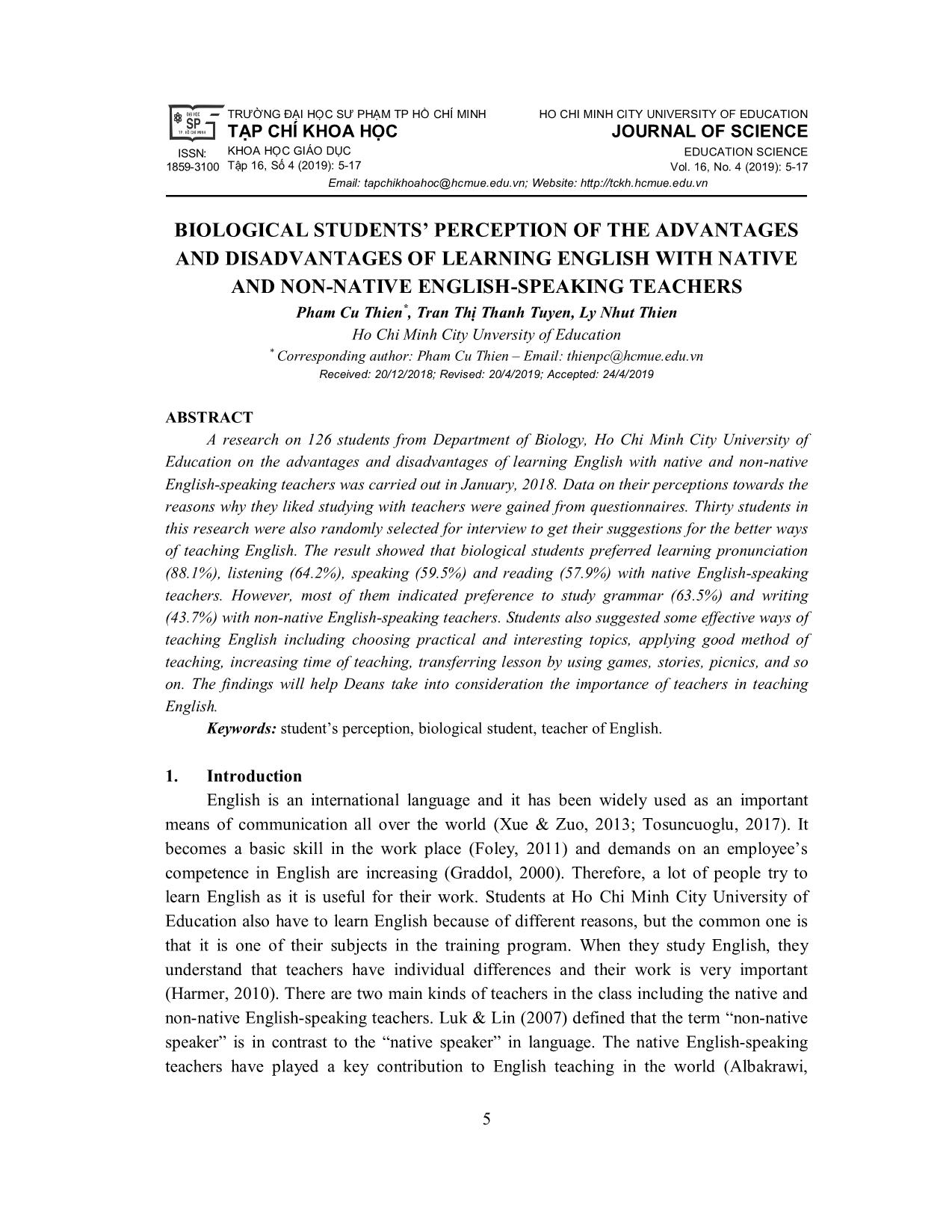
Trang 1
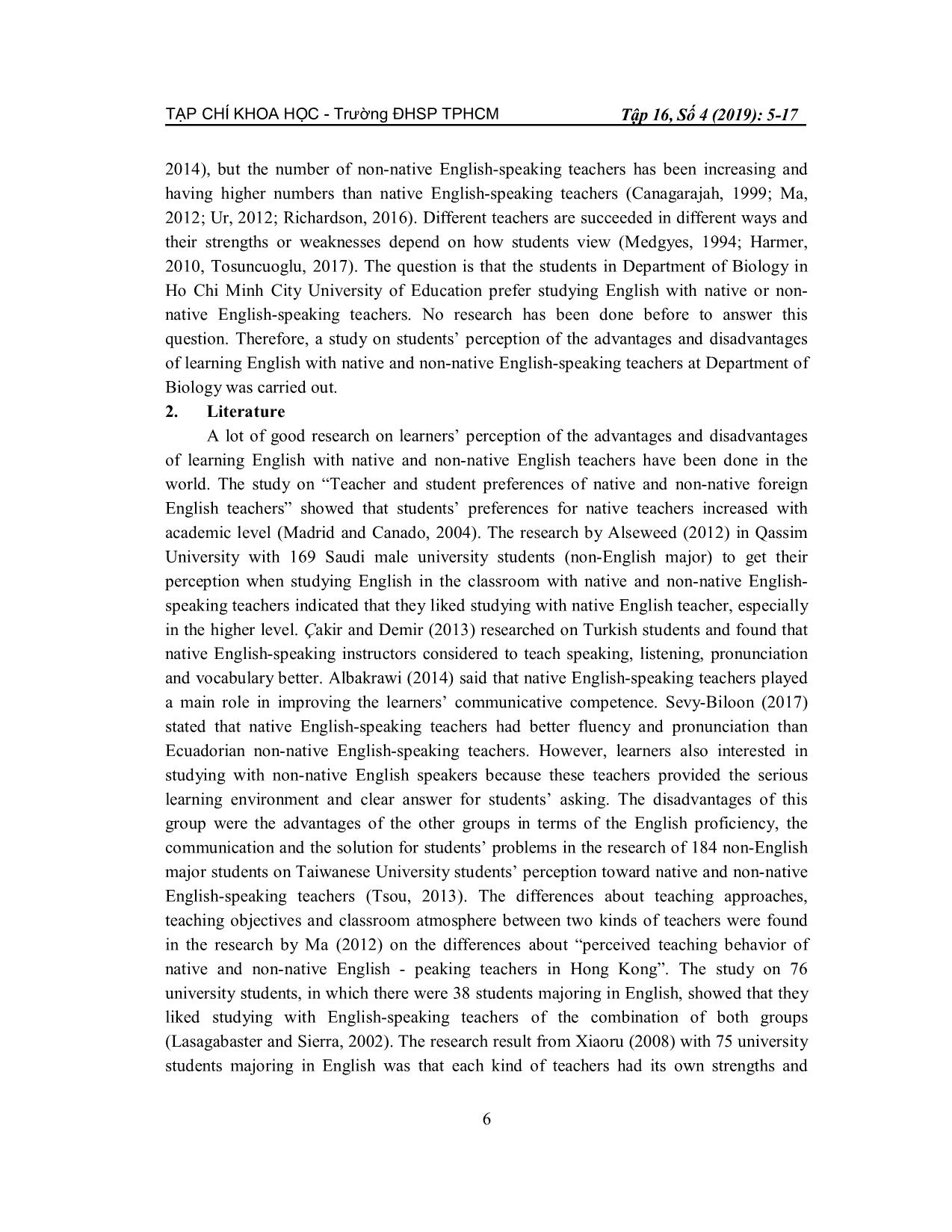
Trang 2
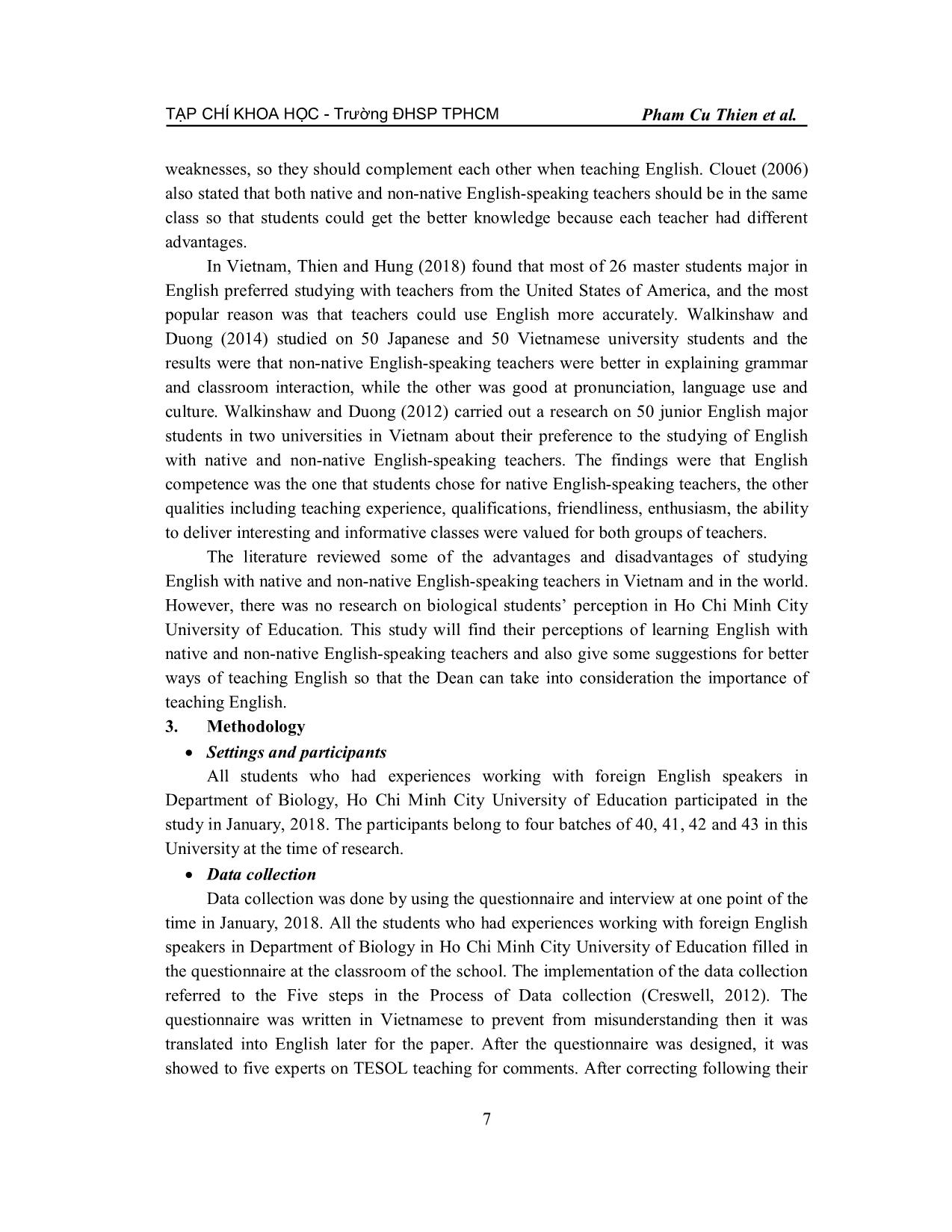
Trang 3
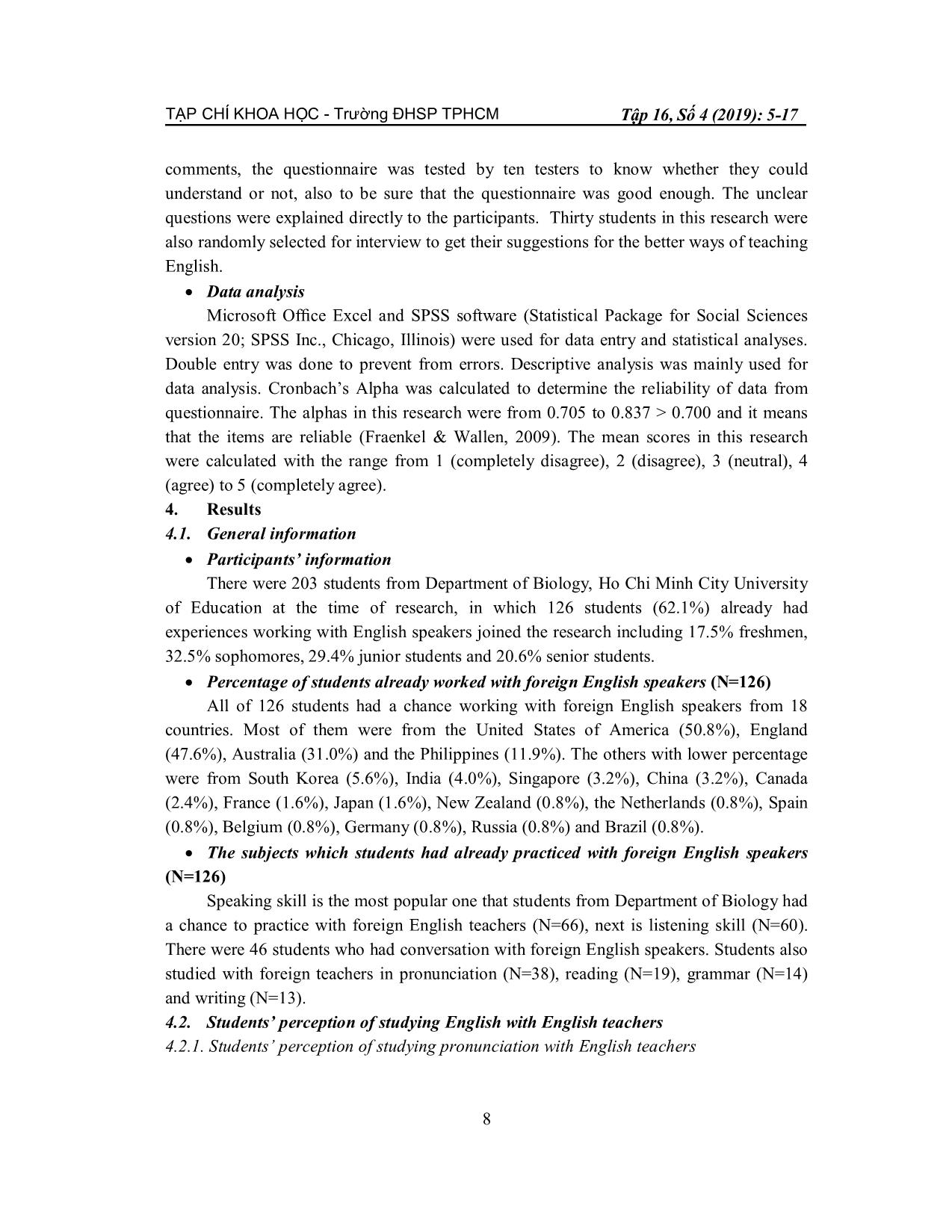
Trang 4
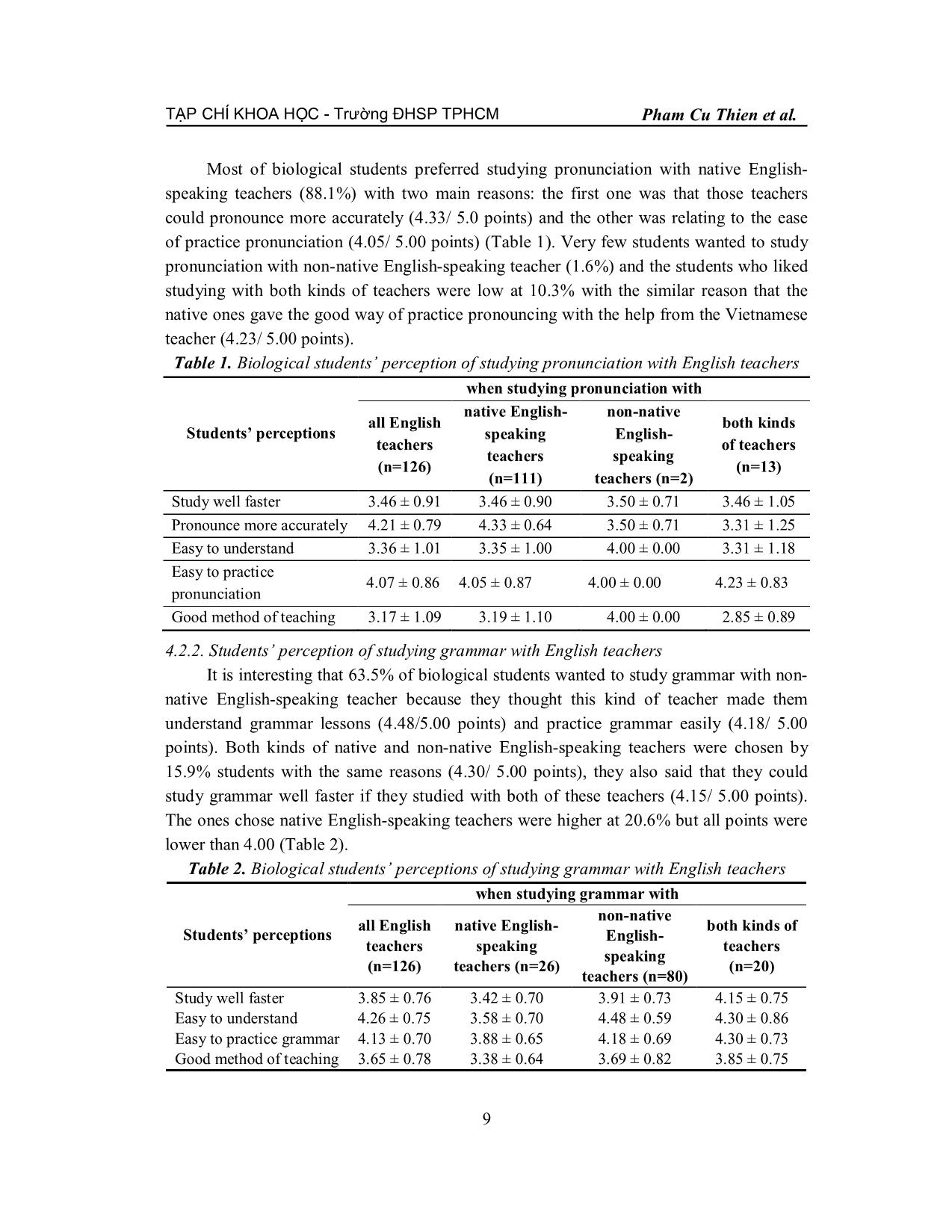
Trang 5
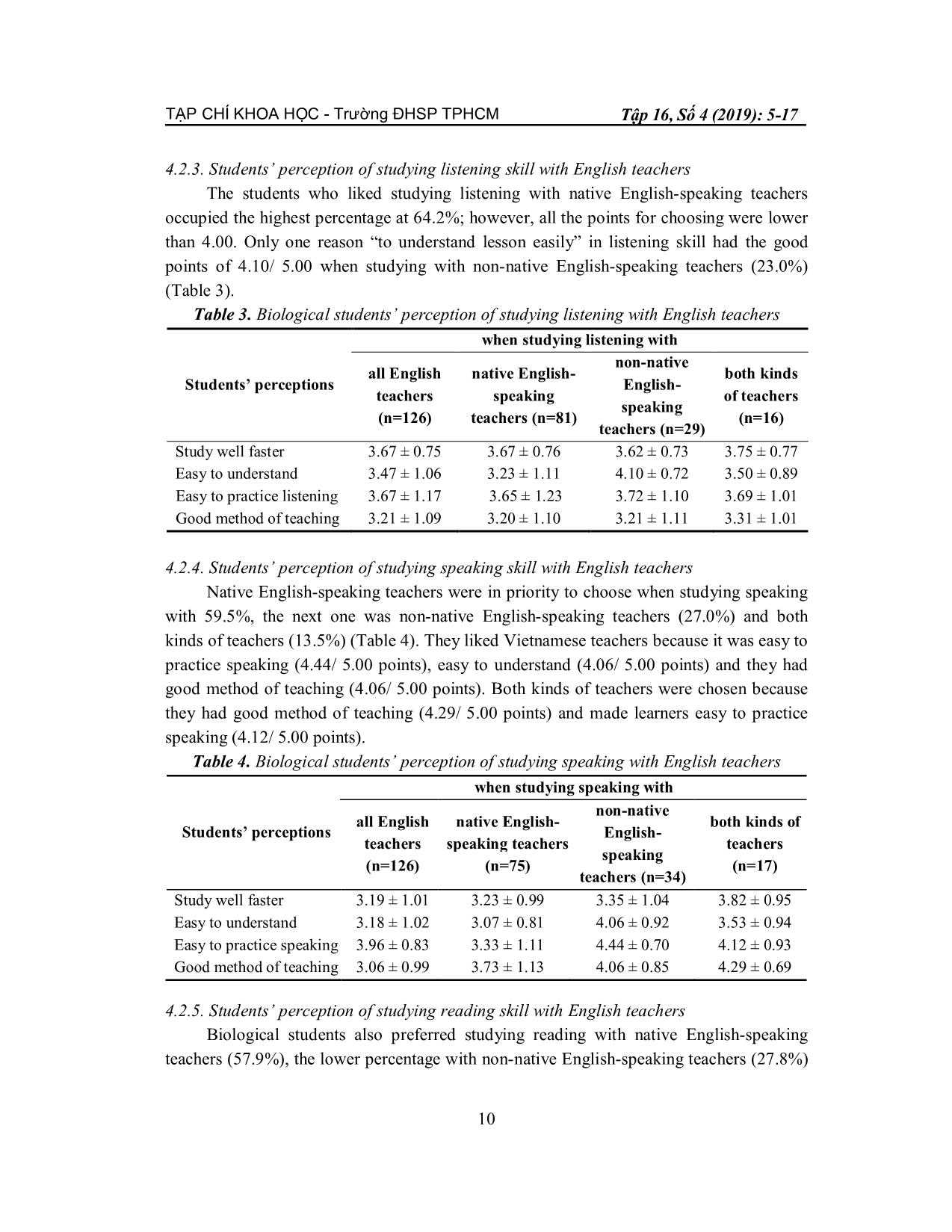
Trang 6
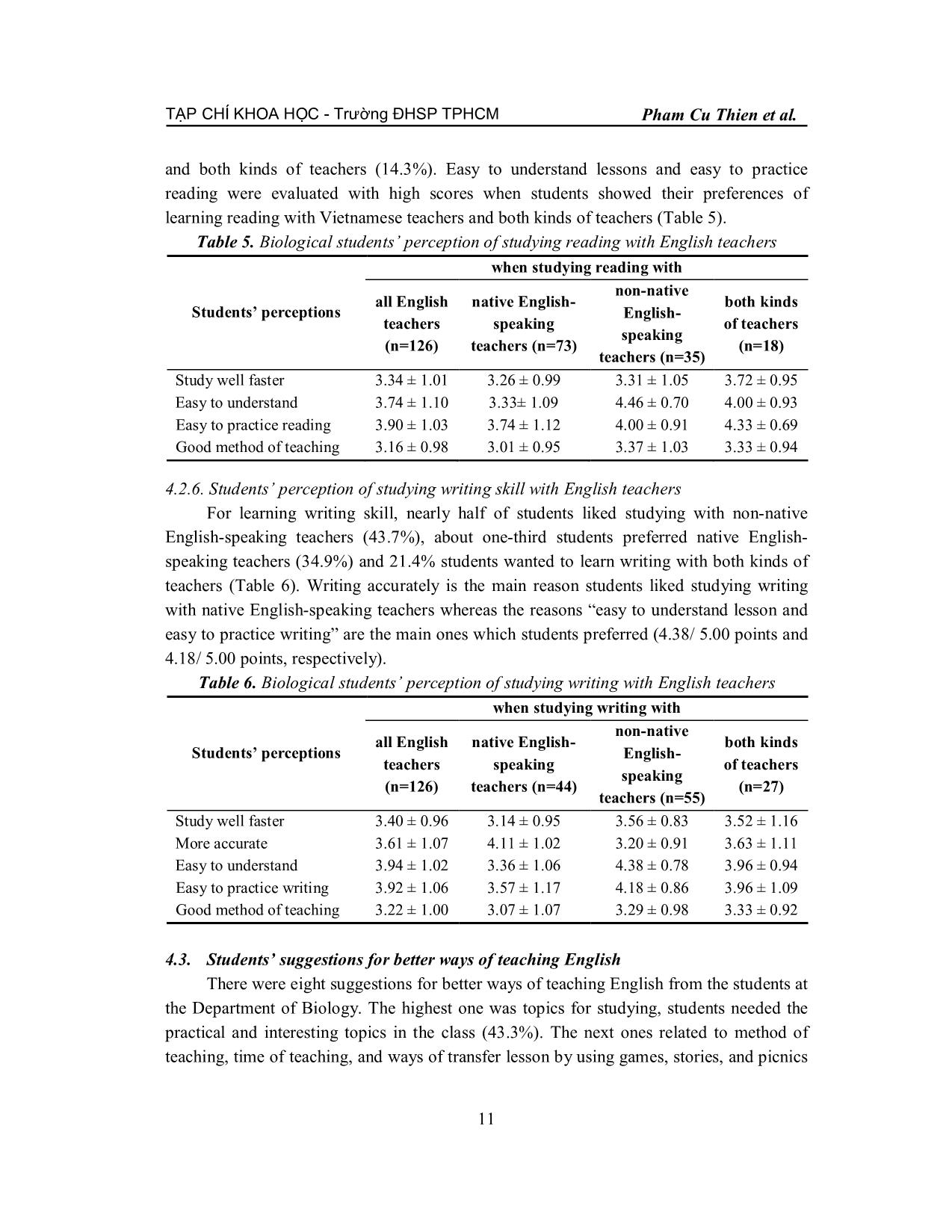
Trang 7
Tóm tắt nội dung tài liệu: Biological students’ perception of the advantages and disadvantages of learning English with native and non-native English-speaking teachers
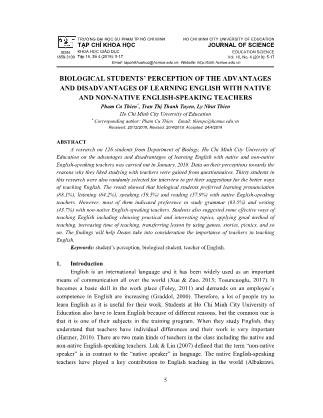
-native English-speaking teachers. However, learners also interested in studying with non-native English speakers because these teachers provided the serious learning environment and clear answer for students’ asking. The disadvantages of this group were the advantages of the other groups in terms of the English proficiency, the communication and the solution for students’ problems in the research of 184 non-English major students on Taiwanese University students’ perception toward native and non-native English-speaking teachers (Tsou, 2013). The differences about teaching approaches, teaching objectives and classroom atmosphere between two kinds of teachers were found in the research by Ma (2012) on the differences about “perceived teaching behavior of native and non-native English - peaking teachers in Hong Kong”. The study on 76 university students, in which there were 38 students majoring in English, showed that they liked studying with English-speaking teachers of the combination of both groups (Lasagabaster and Sierra, 2002). The research result from Xiaoru (2008) with 75 university students majoring in English was that each kind of teachers had its own strengths and TẠP CHÍ KHOA HỌC - Trường ĐHSP TPHCM Pham Cu Thien et al. 7 weaknesses, so they should complement each other when teaching English. Clouet (2006) also stated that both native and non-native English-speaking teachers should be in the same class so that students could get the better knowledge because each teacher had different advantages. In Vietnam, Thien and Hung (2018) found that most of 26 master students major in English preferred studying with teachers from the United States of America, and the most popular reason was that teachers could use English more accurately. Walkinshaw and Duong (2014) studied on 50 Japanese and 50 Vietnamese university students and the results were that non-native English-speaking teachers were better in explaining grammar and classroom interaction, while the other was good at pronunciation, language use and culture. Walkinshaw and Duong (2012) carried out a research on 50 junior English major students in two universities in Vietnam about their preference to the studying of English with native and non-native English-speaking teachers. The findings were that English competence was the one that students chose for native English-speaking teachers, the other qualities including teaching experience, qualifications, friendliness, enthusiasm, the ability to deliver interesting and informative classes were valued for both groups of teachers. The literature reviewed some of the advantages and disadvantages of studying English with native and non-native English-speaking teachers in Vietnam and in the world. However, there was no research on biological students’ perception in Ho Chi Minh City University of Education. This study will find their perceptions of learning English with native and non-native English-speaking teachers and also give some suggestions for better ways of teaching English so that the Dean can take into consideration the importance of teaching English. 3. Methodology Settings and participants All students who had experiences working with foreign English speakers in Department of Biology, Ho Chi Minh City University of Education participated in the study in January, 2018. The participants belong to four batches of 40, 41, 42 and 43 in this University at the time of research. Data collection Data collection was done by using the questionnaire and interview at one point of the time in January, 2018. All the students who had experiences working with foreign English speakers in Department of Biology in Ho Chi Minh City University of Education filled in the questionnaire at the classroom of the school. The implementation of the data collection referred to the Five steps in the Process of Data collection (Creswell, 2012). The questionnaire was written in Vietnamese to prevent from misunderstanding then it was translated into English later for the paper. After the questionnaire was designed, it was showed to five experts on TESOL teaching for comments. After correcting following their TẠP CHÍ KHOA HỌC - Trường ĐHSP TPHCM Tập 16, Số 4 (2019): 5-17 8 comments, the questionnaire was tested by ten testers to know whether they could understand or not, also to be sure that the questionnaire was good enough. The unclear questions were explained directly to the participants. Thirty students in this research were also randomly selected for interview to get their suggestions for the better ways of teaching English. Data analysis Microsoft Office Excel and SPSS software (Statistical Package for Social Sciences version 20; SPSS Inc., Chicago, Illinois) were used for data entry and statistical analyses. Double entry was done to prevent from errors. Descriptive analysis was mainly used for data analysis. Cronbach’s Alpha was calculated to determine the reliability of data from questionnaire. The alphas in this research were from 0.705 to 0.837 > 0.700 and it means that the items are reliable (Fraenkel & Wallen, 2009). The mean scores in this research were calculated with the range from 1 (completely disagree), 2 (disagree), 3 (neutral), 4 (agree) to 5 (completely agree). 4. Results 4.1. General information Participants’ information There were 203 students from Department of Biology, Ho Chi Minh City University of Education at the time of research, in which 126 students (62.1%) already had experiences working with English speakers joined the research including 17.5% freshmen, 32.5% sophomores, 29.4% junior students and 20.6% senior students. Percentage of students already worked with foreign English speakers (N=126) All of 126 students had a chance working with foreign English speakers from 18 countries. Most of them were from the United States of America (50.8%), England (47.6%), Australia (31.0%) and the Philippines (11.9%). The others with lower percentage were from South Korea (5.6%), India (4.0%), Singapore (3.2%), China (3.2%), Canada (2.4%), France (1.6%), Japan (1.6%), New Zealand (0.8%), the Netherlands (0.8%), Spain (0.8%), Belgium (0.8%), Germany (0.8%), Russia (0.8%) and Brazil (0.8%). The subjects which students had already practiced with foreign English speakers (N=126) Speaking skill is the most popular one that students from Department of Biology had a chance to practice with foreign English teachers (N=66), next is listening skill (N=60). There were 46 students who had conversation with foreign English speakers. Students also studied with foreign teachers in pronunciation (N=38), reading (N=19), grammar (N=14) and writing (N=13). 4.2. Students’ perception of studying English with English teachers 4.2.1. Students’ perception of studying pronunciation with English teachers TẠP CHÍ KHOA HỌC - Trường ĐHSP TPHCM Pham Cu Thien et al. 9 Most of biological students preferred studying pronunciation with native English- speaking teachers (88.1%) with two main reasons: the first one was that those teachers could pronounce more accurately (4.33/ 5.0 points) and the other was relating to the ease of practice pronunciation (4.05/ 5.00 points) (Table 1). Very few students wanted to study pronunciation with non-native English-speaking teacher (1.6%) and the students who liked studying with both kinds of teachers were low at 10.3% with the similar reason that the native ones gave the good way of practice pronouncing with the help from the Vietnamese teacher (4.23/ 5.00 points). Table 1. Biological students’ perception of studying pronunciation with English teachers Students’ perceptions when studying pronunciation with all English teachers (n=126) native English- speaking teachers (n=111) non-native English- speaking teachers (n=2) both kinds of teachers (n=13) Study well faster 3.46 ± 0.91 3.46 ± 0.90 3.50 ± 0.71 3.46 ± 1.05 Pronounce more accurately 4.21 ± 0.79 4.33 ± 0.64 3.50 ± 0.71 3.31 ± 1.25 Easy to understand 3.36 ± 1.01 3.35 ± 1.00 4.00 ± 0.00 3.31 ± 1.18 Easy to practice pronunciation 4.07 ± 0.86 4.05 ± 0.87 4.00 ± 0.00 4.23 ± 0.83 Good method of teaching 3.17 ± 1.09 3.19 ± 1.10 4.00 ± 0.00 2.85 ± 0.89 4.2.2. Students’ perception of studying grammar with English teachers It is interesting that 63.5% of biological students wanted to study grammar with non- native English-speaking teacher because they thought this kind of teacher made them understand grammar lessons (4.48/5.00 points) and practice grammar easily (4.18/ 5.00 points). Both kinds of native and non-native English-speaking teachers were chosen by 15.9% students with the same reasons (4.30/ 5.00 points), they also said that they could study grammar well faster if they studied with both of these teachers (4.15/ 5.00 points). The ones chose native English-speaking teachers were higher at 20.6% but all points were lower than 4.00 (Table 2). Table 2. Biological students’ perceptions of studying grammar with English teachers Students’ perceptions when studying grammar with all English teachers (n=126) native English- speaking teachers (n=26) non-native English- speaking teachers (n=80) both kinds of teachers (n=20) Study well faster 3.85 ± 0.76 3.42 ± 0.70 3.91 ± 0.73 4.15 ± 0.75 Easy to understand 4.26 ± 0.75 3.58 ± 0.70 4.48 ± 0.59 4.30 ± 0.86 Easy to practice grammar 4.13 ± 0.70 3.88 ± 0.65 4.18 ± 0.69 4.30 ± 0.73 Good method of teaching 3.65 ± 0.78 3.38 ± 0.64 3.69 ± 0.82 3.85 ± 0.75 TẠP CHÍ KHOA HỌC - Trường ĐHSP TPHCM Tập 16, Số 4 (2019): 5-17 10 4.2.3. Students’ perception of studying listening skill with English teachers The students who liked studying listening with native English-speaking teachers occupied the highest percentage at 64.2%; however, all the points for choosing were lower than 4.00. Only one reason “to understand lesson easily” in listening skill had the good points of 4.10/ 5.00 when studying with non-native English-speaking teachers (23.0%) (Table 3). Table 3. Biological students’ perception of studying listening with English teachers Students’ perceptions when studying listening with all English teachers (n=126) native English- speaking teachers (n=81) non-native English- speaking teachers (n=29) both kinds of teachers (n=16) Study well faster 3.67 ± 0.75 3.67 ± 0.76 3.62 ± 0.73 3.75 ± 0.77 Easy to understand 3.47 ± 1.06 3.23 ± 1.11 4.10 ± 0.72 3.50 ± 0.89 Easy to practice listening 3.67 ± 1.17 3.65 ± 1.23 3.72 ± 1.10 3.69 ± 1.01 Good method of teaching 3.21 ± 1.09 3.20 ± 1.10 3.21 ± 1.11 3.31 ± 1.01 4.2.4. Students’ perception of studying speaking skill with English teachers Native English-speaking teachers were in priority to choose when studying speaking with 59.5%, the next one was non-native English-speaking teachers (27.0%) and both kinds of teachers (13.5%) (Table 4). They liked Vietnamese teachers because it was easy to practice speaking (4.44/ 5.00 points), easy to understand (4.06/ 5.00 points) and they had good method of teaching (4.06/ 5.00 points). Both kinds of teachers were chosen because they had good method of teaching (4.29/ 5.00 points) and made learners easy to practice speaking (4.12/ 5.00 points). Table 4. Biological students’ perception of studying speaking with English teachers Students’ perceptions when studying speaking with all English teachers (n=126) native English- speaking teachers (n=75) non-native English- speaking teachers (n=34) both kinds of teachers (n=17) Study well faster 3.19 ± 1.01 3.23 ± 0.99 3.35 ± 1.04 3.82 ± 0.95 Easy to understand 3.18 ± 1.02 3.07 ± 0.81 4.06 ± 0.92 3.53 ± 0.94 Easy to practice speaking 3.96 ± 0.83 3.33 ± 1.11 4.44 ± 0.70 4.12 ± 0.93 Good method of teaching 3.06 ± 0.99 3.73 ± 1.13 4.06 ± 0.85 4.29 ± 0.69 4.2.5. Students’ perception of studying reading skill with English teachers Biological students also preferred studying reading with native English-speaking teachers (57.9%), the lower percentage with non-native English-speaking teachers (27.8%) TẠP CHÍ KHOA HỌC - Trường ĐHSP TPHCM Pham Cu Thien et al. 11 and both kinds of teachers (14.3%). Easy to understand lessons and easy to practice reading were evaluated with high scores when students showed their preferences of learning reading with Vietnamese teachers and both kinds of teachers (Table 5). Table 5. Biological students’ perception of studying reading with English teachers Students’ perceptions when studying reading with all English teachers (n=126) native English- speaking teachers (n=73) non-native English- speaking teachers (n=35) both kinds of teachers (n=18) Study well faster 3.34 ± 1.01 3.26 ± 0.99 3.31 ± 1.05 3.72 ± 0.95 Easy to understand 3.74 ± 1.10 3.33± 1.09 4.46 ± 0.70 4.00 ± 0.93 Easy to practice reading 3.90 ± 1.03 3.74 ± 1.12 4.00 ± 0.91 4.33 ± 0.69 Good method of teaching 3.16 ± 0.98 3.01 ± 0.95 3.37 ± 1.03 3.33 ± 0.94 4.2.6. Students’ perception of studying writing skill with English teachers For learning writing skill, nearly half of students liked studying with non-native English-speaking teachers (43.7%), about one-third students preferred native English- speaking teachers (34.9%) and 21.4% students wanted to learn writing with both kinds of teachers (Table 6). Writing accurately is the main reason students liked studying writing with native English-speaking teachers whereas the reasons “easy to understand lesson and easy to practice writing” are the main ones which students preferred (4.38/ 5.00 points and 4.18/ 5.00 points, respectively). Table 6. Biological students’ perception of studying writing with English teachers Students’ perceptions when studying writing with all English teachers (n=126) native English- speaking teachers (n=44) non-native English- speaking teachers (n=55) both kinds of teachers (n=27) Study well faster 3.40 ± 0.96 3.14 ± 0.95 3.56 ± 0.83 3.52 ± 1.16 More accurate 3.61 ± 1.07 4.11 ± 1.02 3.20 ± 0.91 3.63 ± 1.11 Easy to understand 3.94 ± 1.02 3.36 ± 1.06 4.38 ± 0.78 3.96 ± 0.94 Easy to practice writing 3.92 ± 1.06 3.57 ± 1.17 4.18 ± 0.86 3.96 ± 1.09 Good method of teaching 3.22 ± 1.00 3.07 ± 1.07 3.29 ± 0.98 3.33 ± 0.92 4.3. Students’ suggestions for better ways of teaching English There were eight suggestions for better ways of teaching English from the students at the Department of Biology. The highest one was topics for studying, students needed the practical and interesting topics in the class (43.3%). The next ones related to method of teaching, time of teaching, and ways of transfer lesson by using games, stories, and picnics
File đính kèm:
 biological_students_perception_of_the_advantages_and_disadva.pdf
biological_students_perception_of_the_advantages_and_disadva.pdf

